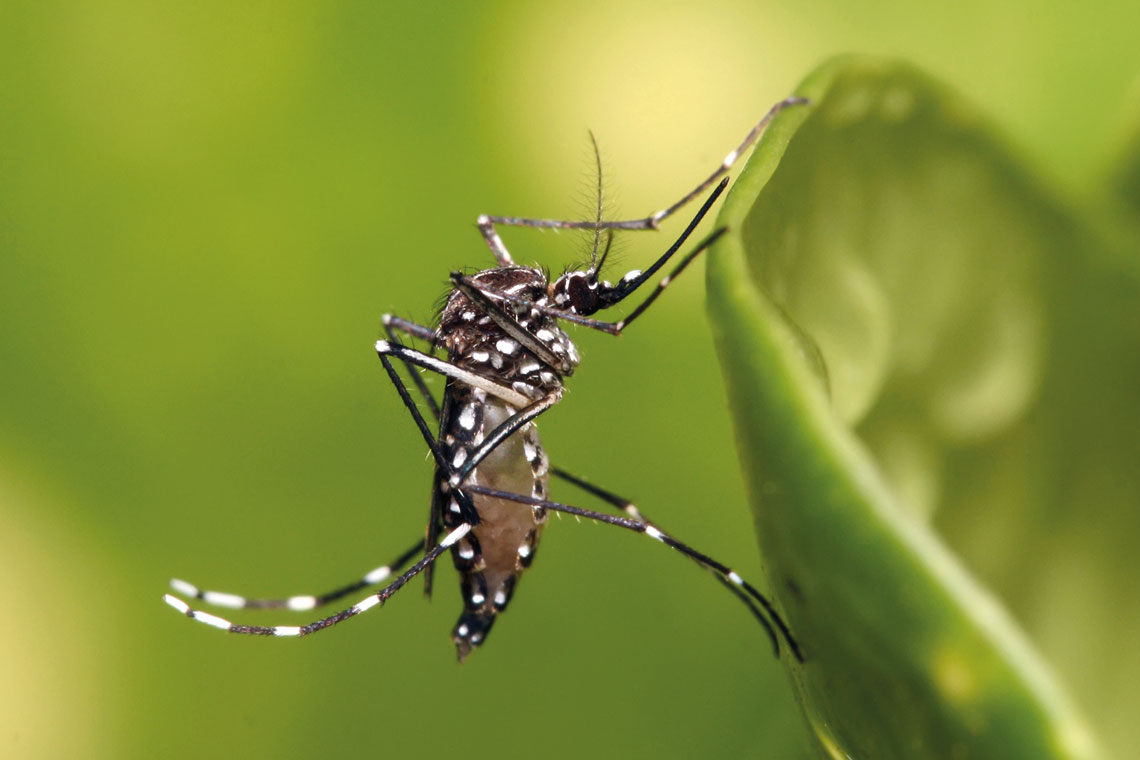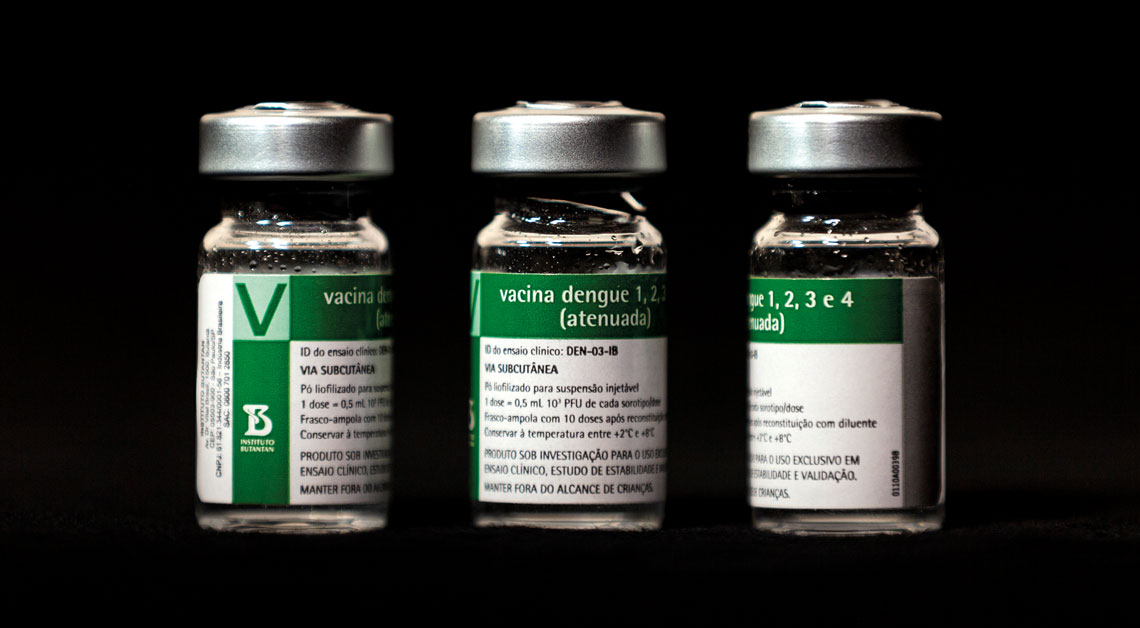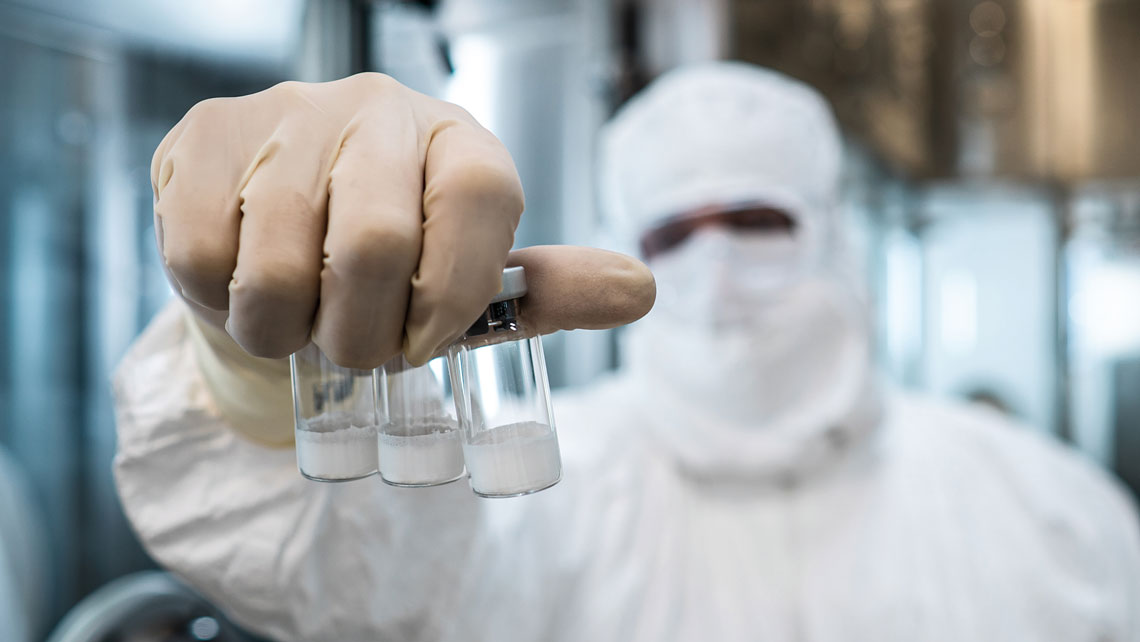The dengue vaccine candidate developed by the Butantan Institute in São Paulo is safe and offers a good level of protection against the disease, according to preliminary data released in December from a phase 3 clinical trial, the last stage before the product can be registered with the regulatory agencies. Serious adverse events, which can lead to hospitalization, were extremely rare: there were three cases (not yet specified) from a total of 10,259 people given the vaccine, corresponding to just 0.03%. The most frequently observed adverse effects were very mild, including pain, swelling, and redness at the site of the injection, and in rarer cases, fever and a red rash that disappeared within a few hours. Known as Butantan-DV, the Brazilian dengue vaccine candidate also showed an initial effectiveness considered highly encouraging: it reduced the risk of illness in recipients later naturally infected by the dengue virus by 79.6% compared to others given an inert compound (placebo).
“This is an excellent level of protection for a vaccine made from an attenuated live virus,” says Fernanda Boulos, medical director of the Butantan Institute and coordinator of the current clinical trial of the vaccine candidate. The institute submitted the results to the Brazilian Health Regulatory Agency (ANVISA), the body responsible for authorizing the use and sale of medicines in the country and monitoring the development of vaccines. The trial must be completed before the institute can apply to register the vaccine for sale, however. The final effectiveness of the compound will only be known in mid-2024, the point at which the last participant to join the study will have been followed for five years. Dengue is one of the most significant infectious diseases in the world. According to data from the World Health Organization (WHO), between 100 million and 400 million people are infected every year by the virus, which is transmitted by mosquitoes of the genus Aedes, especially Aedes aegypti. Most (80%) experience no symptoms, but hundreds of thousands end up in hospital for treatment annually, and thousands die
Designed to evaluate the safety and efficacy of Butantan-DV, the current study—possibly the largest clinical trial of a vaccine ever carried out in the country exclusively by Brazilian researchers—involves 16,235 volunteers aged 2 to 59 from 13 states. Between the trial beginning in February 2016 and the last participant enrolling in July 2019, 10,259 individuals were randomly selected to receive a dose of the vaccine, created to promote immunity against the four known varieties (serotypes) of the dengue virus. Another 5,976, chosen at random, were given a placebo.
Since then, all of them have been periodically monitored at one of 16 centers Butantan helped set up to carry out clinical trials at Brazilian universities and institutes. The objective is to count the total number of individuals who develop dengue after receiving the Butantan vaccine or the placebo and record any adverse effects experienced.

Muhammad Mahdi Karim / Wikimedia CommonsAedes aegypti, the mosquito that transmits the dengue, yellow fever, Zika, and Chikungunya virusesMuhammad Mahdi Karim / Wikimedia Commons
Two years after the study began, 35 cases of dengue had been recorded among the 10,259 participants given Butantan-DV (0.34% of those immunized) and 100 among the 5,976 who received a placebo (1.67%). The Butantan-DV vaccine seems to offer greater protection to those who have previously been exposed to the virus than those who have not. It reduced the risk of dengue by 89.2% in people who had previously had the disease and by 73.5% in those who had never had dengue before entering the study. The same difference in protection had previously been observed in the trials of two other dengue vaccines: Dengvaxia, made by French pharmaceutical company Sanofi Pasteur and already approved for specific segments of the population in Brazil; and Qdenga, developed by Japanese company Takeda, which is currently being analyzed by Anvisa.
“The initial effectiveness of the Butantan vaccine was good, but the overall effectiveness will only be known at the end of the study. Until then, more cases of dengue may occur in both groups and there may be a drop in antibody production, as seen with other vaccines,” says Mauro Teixeira, an immunologist from the Federal University of Minas Gerais (UFMG) who heads one of the centers assessing the compound’s performance. “The interim analysis, planned since the start, was primarily intended to assess the safety of Butantan-DV and whether the study should continue or be stopped. The bottom line is that it appears to be very safe and we should thus proceed.”
Experts say it is not appropriate to compare the effectiveness of different vaccines, since they are usually tested according to different protocols, in different environments and populations. However, looking at data on the protective effect of the Sanofi Pasteur and Takeda vaccines offers an idea of how Butantan-DV is performing. The three formulations all use attenuated viruses, meaning they preserve the ability to multiply but are not capable of causing disease. The Japanese pharmaceutical company’s Qdenga vaccine is produced from the DENV-2 strain, modified to present the surface proteins of all four serotypes. It reduced the risk of developing dengue by about 80% in the general population and 75% in people never exposed to the virus, according to an article published in the New England Journal of Medicine in November 2019. In December 2022, the European Commission approved the vaccine, administered in two doses, for use in adults and children aged 4 and over in the European Union.
Sanofi Pasteur’s vaccine Dengvaxia is made with an attenuated version of the yellow fever virus, modified to present the proteins of the four dengue serotypes. Several clinical trials have indicated that the vaccine, applied in three doses, is less effective. Dengvaxia reduced the risk of dengue by almost 60% in people previously exposed to the virus and by 38% in those who had never had it. It was subsequently found that the vaccine is associated with a higher frequency of hospitalization in children under 9 years of age. In 2015, it was approved for use in several countries, including Brazil, for people aged 9 to 45 years old who have previously had dengue.
Despite appearing promising, the initial effectiveness data of Butantan-DV should be viewed with a level of caution. It has so far only proven effective against two of the four known varieties of the dengue virus: DENV-1 and DENV-2. It reduced the risk of developing dengue caused by serotype 1 by 89.5% on average and serotype 2 by 69.6%, according to data released by Butantan. The DENV-3 and DENV-4 viruses have not circulated in Brazil for a number of years, so it is still not known how the vaccine behaves in response to them.

Instituto ButantanBatch of dengue vaccine candidate used in human trialsInstituto Butantan
“Because of the way it is formulated, Butantan-DV should theoretically offer less protection against serotype 2. But its performance was still very good,” explains Maurício Lacerda Nogueira, a virologist from the São José do Rio Preto School of Medicine (FAMERP) and coordinator of one of the centers participating in the Butantan vaccine trials. “I do not expect it would confer less protection against serotypes 3 and 4, but this still needs to be demonstrated,” says the researcher.
The ability to assess Butantan-DV’s performance against the DENV-3 and DENV-4 varieties is dependent on an uncontrollable factor: that these two serotypes circulate in the country once more by the end of the study. No cases of dengue caused by DENV-3 have been detected for more than a decade. Serotype 4, meanwhile, was responsible for a single epidemic outbreak between 2012 and 2014. If these varieties do not reappear, the only solution may be to conduct clinical trials in countries where serotypes 3 and 4 are present. There are other possibilities, but none are part of Butantan’s strategy. One controversial option, although acceptable from an ethical perspective, would be to deliberately infect volunteers with weakened versions of the DENV-3 and DENV-4 serotypes. It would also be possible to ask the regulatory agencies to authorize Butantan-DV for use only against serotypes 1 and 2.
A tetravalent vaccine that offers good protection against all four varieties of the virus has been sought for some time—each serotype can infect the same person, causing them to suffer from the disease multiple times. An individual bitten by a mosquito carrying DENV-1 will later develop immunity against this serotype. In the future, however, they can be infected by one of the other three varieties and become ill again. To make matters worse, a second infection by a different serotype often tends to cause more severe symptoms. Antibodies produced against one variety of the virus do not always neutralize the others efficiently, leading to partial protection. This incomplete form of immunization, according to some hypotheses, may actually help the virus enter the cells, where it then reproduces and causes a more serious infection.
The Butantan-DV data released in December are the result of more than a decade of work and investments of at least R$300 million. Development of the vaccine was funded by the Brazilian Development Bank (BNDES), FAPESP, the Butantan Foundation, the Brazilian Ministry of Health, and more recently, through a partnership with Merck Sharp & Dohme (MSD). The American pharmaceutical multinational is working on the development of a similar vaccine to be sold outside Latin America (see Pesquisa FAPESP issue no. 275).
A little over a decade ago, Butantan signed a licensing agreement with the US National Institutes of Health (NIH) to use a vaccine prototype created by a team led by Stephen Whitehead, who specializes in vaccines for viruses transmitted by insects, and to develop the final product for exclusive sale in Brazil and other Latin American countries.

Frederick Murphy / CDCElectron microscopy image of specimens of the dengue virus (dark circles)Frederick Murphy / CDC
At the NIH’s Laboratory of Infectious Diseases, Whitehead and his colleagues reduced the dengue virus’s ability to cause disease by eliminating a small portion of its genetic material. It worked for serotypes 1, 3, and 4, but not for 2. The scientists then created a hybrid virus, also known as a chimera, that contains the internal part of DENV-4 and the external part of DENV-2. The four components were then combined to make the dengue fever vaccine.
“The NIH had provided the vaccine prototype and at Butantan we developed and lyophilized the final product, in accordance with good laboratory practices,” explains immunologist Jorge Kalil of the University of São Paulo (USP), who was director of the institute between 2011 and 2017. “The version provided by the NIH needed to be stored at minus 80 degrees Celsius, which requires special freezers and would have made distribution difficult. The Butantan team was able to increase its capacity to produce the virus, improve its purification, and lyophilize the compound [turn it into a powder, which is more stable at room temperature] without it losing its ability to trigger the production of antibodies,” he says.
Previous studies in Brazil had already suggested that Butantan-DV could be highly effective. The phase 2 clinical trial, designed to evaluate safety and immunogenicity in 250 adults, showed that 76% to 92% of individuals given the vaccine who had not previously been exposed to the virus subsequently began producing antibodies against the four serotypes (see Pesquisa FAPESP issue no. 291). Among those who had already had dengue, the proportion ranged from 77% to 82%, according to an article published in Lancet Infectious Diseases in 2020. “The participants maintained high levels of neutralizing antibodies,” says Kalil, coauthor of the paper.
Despite the Sanofi Pasteur and Takeda vaccines being ahead, Butantan’s Fernanda Boulos says that the initial results of the phase 3 trial represent an important step forward, although there is still a long road to ANVISA approval, and that it is important to create a Brazilian dengue vaccine. “Having a domestically produced vaccine guarantees the sovereignty of our country and allows us to more easily serve the public health system,” he says.
Projects
1. Dengue: Production of experimental batches of a tetravalent dengue vaccine candidate (no. 08/50029-7); Grant Mechanism Research Grant; SUS Research Program – PITE; Principal Investigator Isaías Raw (Butantan Institute); Investment R$1,926,149.72.
2.Continuous improvement of vaccines: Center for Viral Surveillance and Serological Assessment (CEVIVAS) (no. 21/11944-6); Grant Mechanism Science Centers for Development; Principal Investigator Sandra Coccuzzo Sampaio Vessoni (Butantan); Investment R$4,983,760.42.
3. Characterization of DENV-specific antibodies in seropositive adults vaccinated with tetravalent formulation TV003 ( no. 15/03933-3); Grant Mechanism Postdoctoral Fellowship in Brazil; Supervisor Esper Georges Kallás (USP); Beneficiary Cássia Gisele Terrassani Silveira; Investment R$310,449.10.
Scientific articles
KALLÁS, E. G. et al. Safety and immunogenicity of the tetravalent, live-attenuated dengue vaccine Butantan-DV in adults in Brazil: A two-step, double-blind, randomised placebo-controlled phase 2 trial. The Lancet Infectious Diseases. July 1, 2020.
SILVEIRA, C. G. T. et al. Plasmablast expansion following the tetravalent, live-attenuated dengue vaccine Butantan-DV in DENV-naïve and DENV-exposed individuals in a Brazilian Cohort. Frontiers in Immunology. June 28, 2022.


